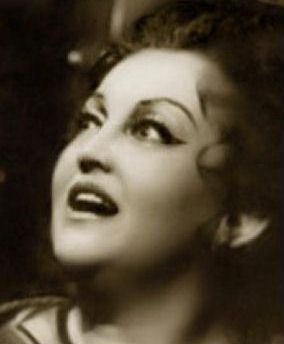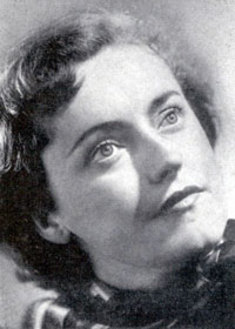Related Research Articles

Leopoldine Rysanek was an Austrian dramatic soprano.

Dame Gwyneth Jones is a Welsh dramatic soprano, widely regarded as one of the greatest Wagnerian sopranos in the second half of the 20th century.

Doris Soffel is a German mezzo-soprano.
Martha Mödl was a German soprano, and later a mezzo-soprano. She specialized in large dramatic roles such as Isolde, Brünnhilde, and particularly Kundry, and is considered, along with Astrid Varnay and Birgit Nilsson, one of the three major postwar Wagner sopranos. She was among the preeminent Wagner sopranos—and most compelling singing actresses—of the twentieth century. She was celebrated for her highly individualized interpretations, exceptional acting ability, intense stage presence, and "rich, sexy voice."

Violeta Urmanavičiūtė-Urmana is a Lithuanian opera singer who has sung leading mezzo-soprano and soprano roles in the opera houses of Europe and North America.
Dunja Vejzović is an operatic mezzo-soprano and soprano from Croatia.
Janice Baird is an American dramatic soprano, best known for her interpretation of Wagner and Strauss. Baird was born in New York City.
Deborah Polaski is an American opera and concert singer (soprano). She has specialized in dramatic soprano roles and also sings mezzo-soprano roles occasionally.
Susan Owen is an American operatic soprano. Born in Salisbury, North Carolina, she earned a Bachelor of Music degree from East Carolina University in 1980 and a Master of Music degree from the University of Texas at Austin in 1983. In 1990 she won the Metropolitan Opera National Council Auditions. From 1995 to 1999 she was a member of the Staatstheater Kassel, Intendant Michael Leinert. From 1999 to 2002 she was a member of the Staatstheater Darmstadt with Mark Albrecht.
Irene Dalis was an American mezzo-soprano singer, who had a long international career at the highest levels of world opera. In 1946, she received her bachelor's degree from San Jose State College, where she regarded herself not as a singer, but as a pianist.

Karin Branzell was a Swedish operatic contralto, who had a prominent career at the Metropolitan Opera, New York, and in Europe. Her very wide range enabled her to sing both contralto roles and the occasional soprano role. She was particularly noted for her singing of the music of Richard Wagner, in roles such as Ortrud (Lohengrin), Venus (Tannhäuser), Erda, Brangäne, and Brunnhilde. She was considered on a par with Margarete Klose and Kerstin Thorborg as a Wagnerian contralto. Amneris (Aida), Dalila, Herodias (Salome), and Clytemnestra (Elektra) were among her other renowned roles.

Ursula Schröder-Feinen was a German operatic dramatic soprano who performed internationally, including at the Metropolitan Opera and the Bayreuth Festival.

Ella Némethy was a Hungarian mezzo-soprano who had an active international career in operas and concerts from 1919 to 1948. Music historian Péter P. Várnai writes in The New Grove Dictionary of Music and Musicians that "she was the leading mezzo-soprano in the interwar years, especially in Wagnerian roles such as Brünnhilde, Isolde and Kundry. Her interpretations were characterized by vocal amplitude, rich colouring and grand declamation." She was the mother of author Baba Macnee, who would marry actor Patrick Macnee in 1988.

Elisabeth Schärtel was a German operatic mezzo-soprano and contralto. A member of the Cologne Opera from 1959 to 1967, she performed leading parts at major European opera houses and regularly at the Bayreuth Festival.
Lioba Braun is a German opera singer and academic teacher at the Hochschule für Musik und Tanz Köln and the Hochschule für Musik und Theater München. Based at the Nationaltheater Mannheim, she has appeared mostly in mezzo-soprano parts at major opera houses and festivals. She became internationally known appearing as Brangäne at the Bayreuth Festival in 1994, and performed the soprano part of Isolde on stage first in 2012.
Ute Vinzing is a German dramatic soprano who received the title Kammersängerin. She is known for roles such as Wagner's Brünnhilde, Isolde, Ortrud and Kundry, and for Elektra and the Dyer's Wife by Richard Strauss, which she performed internationally.
Erna Schlüter was a German operatic dramatic soprano and voice teacher. Beginning as a contralto at the Oldenburgisches Staatstheater in 1922, she moved to the Nationaltheater Mannheim in 1925 where her voice developed to dramatic soprano, to the Stadttheater Düsseldorf in 1930 where she appeared in 1933 in the world premiere of Winfried Zillig's Der Rossknecht and was awarded the title Kammersängerin. Her last station, from 1940, was the Hamburg State Opera.
Ruth Hesse is a German dramatic mezzo-soprano. She was a member of the Deutsche Oper Berlin from 1962 to 1995, and appeared internationally, including the Bayreuth Festival and the Salzburg Festival. She appeared regularly at the Vienna State Opera from 1965 to 1988, and was appointed an Austrian Kammersängerin in 1982. In Berlin, she took part in the world premiere of Henze's Der junge Lord.
Linda Watson is an American dramatic soprano and academic voice teacher. She made her career based in Germany where she studied and began as a mezzo-soprano at the Theater Aachen. She has performed worldwide, including at the Vienna State Opera, La Scala, the Metropolitan Opera and the Bayreuth Festival. She focused on dramatic roles by Wagner, including Brünnhilde and Isolde, and Strauss, including Ariadne and the Dyer's Wife. She was awarded the title Kammersängerin in Germany in 2004 and in Austria in 2020.
Camilla Kallab was an Austrian and later German operatic mezzo-soprano who appeared internationally.
References
- ↑ Sigrid Kehl on Säcksische Akadamie der Künste
- ↑ Sigrid Kehl on Isoldes-liebestod.net
- ↑ Ein Opernabend mit Sigrid Kehl on WorldCat
- ↑ Recordings on JPC